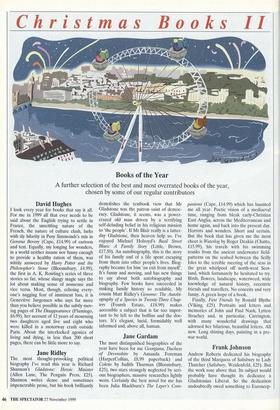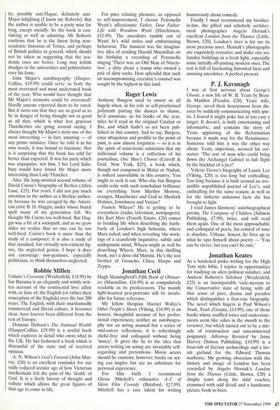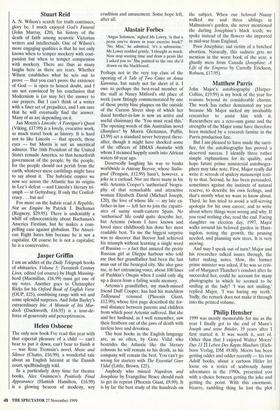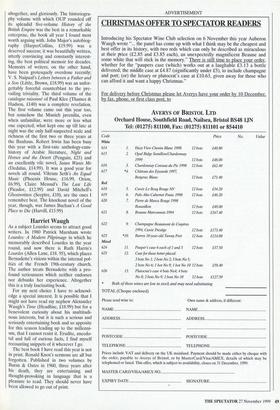Christmas Books II
Books of the Year
A further selection of the best and most overrated books of the year, chosen by some of our regular contributors David Hughes
I look every year for books that say it all, For me in 1999 all that ever needs to be said about the English trying to settle in France, the unsettling nature of the French, the nature of culture clash, lurks with sly hilarity in Posy Simmonds's mix in Gemma Bovery (Cape, £14.99) of cartoon and text. Equally, my longing for wonders, in a world neither insane nor funny enough to provide a healthy ration of them, was wittily answered by Hany Potter and the Philosopher's Stone (Bloomsbury, £4.99), the first in A. K. Rowling's series of three stories so far, whose slangy magic says the lot about making sense of nonsense and vice versa. Most, though, echoing every- one's nagging fear of imminent loss, it is Genevieve Jurgensen who says far more than you believe possible in the subtly mov- ing pages of The Disappearance (Flamingo, £6.99), her account of 12 years of mourning two daughters aged five and eight who were killed in a motorway crash outside Paris. About the interlocked agonies of living and dying, in less than 200 short pages, there can be little more to say.
Jane Ridley
The most thought-provoking political biography I've read this year is Richard Shannon's Gladstone: Heroic Minister (Allen Lane, The Penguin Press, £25). Shannon writes dense and sometimes impenetrable prose, but his book brilliantly demolishes the textbook view that Mr Gladstone was the patron saint of democ- racy. Gladstone, it seems, was a power- crazed old man driven by a terrifying self-deluding belief in his religious mission to the people'. If Mr Blair really is a latter- day Gladstone, then heaven help us, I've enjoyed Michael Holroyd's Basil Street Blues: A Family Story (Little, Brown, £1730). An autobiography, this is the story of his family and of a life spent escaping from them into other people's lives. Biog- raphy became for him an exit from myself'. It's funny and moving, and has new things to say about both autobiography and biography. Few books have succeeded in making family history so readable. My cousin Matt Ridley's Genome: The Autobi- ography of a Species in Twenty-Three Chap- ters (Fourth Estate, £18.99) makes accessible a subject that is far too impor- tant to be left to the boffins and the doc- tors. It's elegant, lucid, formidably well informed and, above all, human.
Jane Gardam
The most distinguished biographies of the year have been for me Georgiana, Duchess of Devonshire by Amanda Foreman (HarperCollins, £8.99 paperback) and Colette by Judith Thurman (Bloomsbury, £25), two stars strangely neglected by seri- ous biographers, massive researches lightly worn. Certainly the best novel for me has been Julia Blackburn's The Leper's Com- panions (Cape, £14.99) which has haunted me all year. Poetic vision of a mediaeval time, ranging from bleak early-Christian East Anglia, across the Mediterranean and home again, and back into the present day. Horrors and wonders. Short and certain. But the book that has given me the most cheer is Waterlog by Roger Deakin (Chatto, £15.99), his travels with his swimming trunks from the ancient underwater field- patterns on the seabed between the Scilly Isles to the terrible meeting of the seas in the great whirlpool off north-west Scot- land, which fortunately he hesitated to try. Birds, flowers, landscape, waterweed, wide knowledge of natural history, eccentric friends and travellers. No conceits and very funny. A green hope of a book.
Finally, First Friends by Ronald Blythe (Viking, £25). Portraits and letters and memories of John and Paul Nash, Lytton Strachey and, in particular, Carrington, with many wonderful drawings that adorned her hilarious, beautiful letters. All new. Long shining days, painting in a pre- war world.
Frank Johnson
Andrew Roberts dedicated his biography of the third Marquess of Salisbury to Lady Thatcher (Salisbury, Weidenfeld, £25). But the work rose above that. Its subject would probably have thought its dedicatee a Gladstonian Liberal. So the dedication undoubtedly owed something to Euroscep- tic, possibly anti-Hague, definitely anti- Major infighting (I know my Roberts). But the author is unable to be a party man for long, except socially. So the book is con- vincing as well as admiring. Mr Roberts confirms that he is the finest living non- academic historian of Tories, and perhaps of British politics in general, which should not be taken as suggesting that the aca- demic ones are better. Long may leftish drudges in the universities and polytechnics envy his fame.
John Major's autobiography (Harper- Collins, £19.99) could serve as both the most overrated and most underrated book of the year. Who would have thought that Mr Major's memoirs could be overrated? Hardly anyone expected them to be rated. But it turns out that they are so good as to be in danger of being thought not as good as all that, which is what less gracious Thatcherites are going around saying. I always thought Mr Major's story one of the most interesting — in fact, amazing — of any prime minister. Once he told it in his own words, it was bound to fascinate. Nor is it surprising that the book has sold far better than expected. It was his party which was unpopular, not him. I bet Lord Salis- bury would have found Mr Major more interesting than Lady Thatcher.
Also, the long-awaited second volume of David Cairns's biography of Berlioz (Allen Lane, £25). For years, I did not pay much attention to the author as a Berlioz author- ity because he was savaged by the Ameri- can critic B. H. Haggin, under whose brutal spell many of my generation fell. We thought Mr Calms too well-bred. But Hag- gin was a bit of a sociopath, and as we grow older we realise that no one can be too well-bred. Cairns's book is more than the study of a composer; it is also a study of that standard, but virtually non-existent fig- ure, the neglected genius. I hope it does not encourage non-geniuses, especially politicians, to think themselves neglected.
Robbie Millen
Voltaire's Coconuts (Weidenfeld, £18.99) by Ian Buruma is an elegantly and wittily writ- ten account of the continental love affair with, or hate of, the English (or rather their conception of the English) over the last 200 years. The English, with their unashamedly commercial and liberal culture, it becomes clear, have forever been different from the rest of Europe.
Dominic Hobson's The National Wealth (HarperCollins, £29.99) is a zestful book which explores in detail who owns what in the UK. He has fashioned a book which is distrustful of the state and of received opinion.
A. N. Wilson's God's Funeral (John Mur- ray, £20) is an excellent reminder for our sadly reduced secular age of how Victorian intellectuals felt the pain of the `death' of God. It is a lively history of thought and culture which allows the great figures of that age to come to life. For pure relaxing pleasure, as opposed to self-improvement, I choose PetroneIla Wyatt's affectionate Father, Dear Father: Life with Woodrow Wyatt (Hutchinson, £15.99). The anecdotes tumble out of Wyatt Sr's wild antics and embarrassing behaviour. The funniest was his imagina- tive idea of sending Harold Macmillan on his birthday a recording of PetroneIla singing 'There was an Old Man of Ninety- two', a ditty about a tramp who owned a pair of dirty socks. How splendid that such an uncompromising eccentric's counsel was sought by the highest in this land.
Roger Lewis
Anthony Burgess used to annoy us all hugely when, in his role as self-proclaimed polymath putting the dunces to shame, he'd nominate, as his books of the year, titles he'd read in the original Catalan or lbo, and which hadn't as yet been pub- lished in this country. Sad to say, Burgess, once ubiquitous and prolific to the point of pain, is now almost forgotten — so it is in the spirit of semi-ironic salutation that my millennial volume is a collection of his journalism, One Man's Chorus (Carroll & Graf, New York, $25), a book which, though not composed in Malay or Nadsat, is indeed unavailable in this country. You ought to seek it out. Who else but Burgess could write with such nonchalant brilliance on everything from Marilyn Monroe, oranges, Manchester and God to Sherlock Holmes, Jewishness and Venice?
Francis Wheen? He is getting to be everywhere (radio, television, newspapers). His Karl Marx (Fourth Estate, £20) comes to bristling life when describing the burly- burly of London's high bohemia, where Marx toiled; and when revealing 'the work- ings of a ceaselessly inquisitive, subtle and undogmatic mind, Wheen might as well be describing Wheen. Marx, in this thrilling book, isn't a dour old Marxist. He's the lost brother of Groucho, Chico, Harpo and Zeppo.
Jonathan Cecil
Hugh Massingberd's Fifth Book of Obituar- ies (Macmillan, £16.99) is as compulsively readable as its predecessors. The mainly light-hearted pen-portraits will be invalu- able for future reference.
My fellow thespian Harriet Walter's Other People's Shoes (Viking, £16.99) is an honest, thoughtful account of her profes- sional experiences; neither an autobiogra- phy nor an acting manual but a series of mid-career reflections, it is refreshingly cliché-free and colloquial without being 'matey'. It gives the lie to the idea that actors writing on acting are invariably self- regarding and pretentious. Movie actors should be cautious, however; books on act- ing can inspire but are no substitute for personal experience.
For film buffs I recommend Glenn Mitchell's exhaustive A-Z of Silent Film Comedy (Batsford, 47.99). Mitchell has a rare talent for writing humorously about comedy.
Finally I must recommend my brother- in-law, the gifted and scholarly architec- tural photographer Angelo Homak's excellent London from the Thames (Little, Brown, £20). London's river is for me its most precious asset. Homak's photographs are exquisitely evocative and make one see familar buildings in a fresh light, especially some initially off-putting modern ones. The text is full of fascinating historical facts and amusing anecdotes. A perfect present.
P. J. Kavanagh
I was at first nervous about George's Ghosts, a new life of W. B. Yeats by Bren- da Maddox (Picador, £20). Yeats' wife, George, saved their honeymoon from dis- aster by suddenly communicating with spir- its. I feared it might poke fun at too easy a target. It doesn't, is both entertaining and informative, and contains the story of Yeats approving of the Reformation because it made way for the Renaissance. Someone told him it was the other way about. Yeats, imperious, accused his cor- rector; 'The sort of man who could bring down the Archangel Gabriel in full flight by the brickbat of a fact!'
Valerie Grove's biography of Laurie Lee (Viking, £20) is too long but enthralling. Too long because it is built around an irre- sistible unpublished journal of Lee's, and enthralling for the same reason; as well as for the hitherto unknown facts she has brought to light.
I read James Simmons' autobiographical poems, The Company of Children (Salmon Publishing, £7.99), twice, and will read them again. One of the most approachable and colloquial of poets, his control of tone is absolute. Urbane, honest, he lives up to what he says himself about poetry — 'You can be clever, but you can't be cute.'
Jonathan Keates
As a hardened pinko writing for the High Tory style bible, I rejoice in opportunities for studying an alien political mindset, and Andrew Roberts's Salisbury (Weidenfeld, 25) is an incomparable vade-mecum to the Conservative state of being, with all that sense of pace, drama and paradox which distinguishes a first-rate biography. The novel which lingers is Paul Wilson's Noah, Noah (Granta, £14.99), one of those books whose muffled tones and understate- ments seem like ashes in the mouth to the reviewer, but which turned out to be a mir- acle of construction and unsentimental poignancy. Adlestrop Revisited by Anne Harvey (Sutton Publishing, £10.99) is a bran-tub of literary archaeology and a lav- ish garland for the Edward Thomas warhorse. My growing obsession with the history and image of London has been rewarded by Angelo Hornak's London from the Thames (Little, Brown, £20) a dinghy trawl along the tidal reaches, crammed with odd detail and a handsome picture book to boot.
Stuart Reid
A. N. Wilson's search for truth continues, glory be. I much enjoyed God's Funeral (John Murray, £20), his history of the death of faith among neurotic Victorian writers and intellectuals. One of Wilson's more engaging qualities is that he not only knows when to temper mockery with com- passion but when to temper compassion with mockery. There are thus as many laughs here as there are tears. Whether Wilson establishes what he sets out to prove — that you can't prove the existence of God — is open to honest doubt, and I am not convinced by his conclusion that Modernism is (or may be) the answer to our prayers. But I can't think of a writer with a finer set of prejudices, and I am sure that he will eventually find the answer. Many of us are depending on it.
Jan Morris's Lincoln: A Foreigner's Quest (Viking, £17.99) is a lovely, evocative work, as much travel book as history. It is hard not to like Lincoln — that speech, those eyes — but Morris is not an uncritical admirer. The 16th President of the United States remade America, so that henceforth government of the people, by the people, for the people should not perish from the earth, whatever mere earthlings might have to say about it. The hubristic empire we now see across the Atlantic has its origins in Lee's defeat —and Lincoln's literary tri- umph — at Gettysburg. If only the Confed- eracy. ... but no!
For more on the hubris read A Republic, Not an Empire by Patrick J. Buchanan (Regnery, $29.95). There is undeniably a whiff of ethnocentricity about Buchanan's America Firstism, but he makes a com- pelling case against globalism. The Ameri- can Right hates him because he is not a capitalist. Of course he is not a capitalist; he is a conservative.
Jasper Griffin
I am an addict of the Daily Telegraph books of obituaries Volume 5: Twentieth Century Lives, edited (of course) by Hugh Massing- berd (Macmillan, £16.99) must get one of my votes. Another goes to Christopher Ricks for his Oxford Book of English Verse (OUP, £25), combining range with wit and some splendid surprises. And John Bayley's extraordinary Iris: A Memoir of his Mur- doch (Duckworth, £16.95) is a tour-de- force of generosity and perceptiveness.
Helen Osborne
The only new book I've read this year with that especial pleasure of a child — can't bear to put it down, can't bear to finish it — was Rose Tremain's novel, Music and Silence (Chatto, £16.99), a wonderful tale about an English lutenist at the Danish court, spellbindingly told.
In a particularly dozy time for theatre books, Alec Guinness's Positively Final Appearance (Hamish Hamilton, £16.99) is a glowing beacon of modesty, wry erudition and amusement. Some hope left, after all.
Alastair Forbes
'Angus Solomon,' sighed Ms Lowry, 'is that a penis you've drawn in your exercise book?' 'No, Miss,' he admitted, 'it's a submarine.' Ms Lowry nodded grimly. 'I thought as much. Now stop wasting time and draw a penis like I asked you to.' She pointed to the one she'd drawn on the blackboard.
Perhaps not in the very top class of the opening of A Tale of Two Cities or Anna Karenina, but surely not far short of it. I owe to perhaps the best-read member of the staff at Nancy Mitford's old place of work (now fittingly commemorated by one of those pretty blue plaques on the outside of the Curzon Street shop of which her ducal brother-in-law is now an active and useful chairman) the `You must read this.'
The opening words of this Australian novel (Bumfacel by Morris Gleitzman, Puffin, £3.99) set a standard never betrayed there- after, though it might have shocked some of the officers of HMAS Australia with whom I steamed happily south into African waters 60 year ago.
Deservedly laughing his way to banks worldwide is Antony Beevor, whose Stalin-
grad (Penguin, £12.99) hasn't, however, a joke in a carload. Nor are there many in his wife Artemis Cooper's `authorised' biogra- phy of that remarkable and attractive woman Elizabeth David (Michael Joseph, £20), the love of whose life — my late ex- father-in-law — left her to join the expatri- ates of sunny south-eastern Spain. No 'authorised' life could quite describe her, but Artemis (whom I have known and loved since childhood) has done her most readable best. To me the biggest surprise was to discover that Beevor had achieved his triumph without learning a single word of Russian — a fact that amazed the pretty Russian girl at Dieppe harbour who told me that her grandfather had been the last man out of the besieged city. She also gave me, in her entrancing voice, about 100 lines of Pushkin's Onegin when I could only dig up a dozen from a failing senile memory.
Artemis's grandfather, my much-missed friend Duff Cooper, has had his matchless Talleyrand reissued (Phoenix Giant, £12.99), whose first page described the for- mal distance between parents and children from which poor Artemis suffered. But she and her husband, as I well remember, saw their firstborn out of the jaws of death with tireless love and devotion.
The best books in the English language are, as so often, by Gore Vidal who bestrides the Atlantic like the literary colossus he will remain to his death, as his company will remain the best. You can't go wrong for starters with The Essential Gore Vidal (Little, Brown, £25).
Anybody who missed Napoleon and Josephine by Evangeline Bruce should rush to get its reprint (Phoenix Giant, £9.99). It is by far the best study of the hundreds on the subject. When our beloved Nanny walked me and three siblings in Malmaison's garden, she never mentioned the darling Josephine's black teeth; we spoke instead of the flowers she imported in mid-war from England.
Poor Josephine; sad victim of a botched abortion. Naturally, this sadness gets no mention in the worst book of the year, a ghastly mess from Canada (Josephine: A Life of the Empress by Carrolly Erickson, Robson, £17.95).
Matthew Parris
John Major's autobiography (Harper- Collins, £19.99) is my book of the year for reasons beyond its considerable charms. The work has rather dominated my year because Mr Major nicked my invaluable researcher to assist him with it. Researchers are a zero-sum game and the strengths of the Major tome have therefore been matched by a research famine in the Parris production line.
But I am pleased to have made the sacri- fice, for the autobiography has proved a deserved success. I identify three rather simple explanations for its quality, and hope future prime ministerial autobiogra- phers may take note. First, Major really did write it: screeds of spidery manuscript testi- fy to that. Second, he has been persuaded, sometimes against the instincts of natural reserve, to describe his own feelings, and that's mostly what we want to know about. Third, he has tried to avoid a self-serving apologia for his own career, and to write about where things went wrong and why. If you read nothing else, read the end. Facing slaughter on election day, 1997, Major walks around his beloved garden in Hunt- ingdon, noting the growth, the pruning needed, and planning new trees. It is very moving.
And may I speak out of turn? Major and his researcher talked issues through, the latter making notes. How, the former prime minister was asked, if he was so criti- cal of Margaret Thatcher's conduct after he succeeded her, could he account for many photographs in which he seemed to be smiling at the lady? `I was not smiling,' replied Major, 'I was baring my teeth.' Sadly, the remark does not make it through into the printed volume.
Philip Hensher
1999 was mostly memorable for me as the year I finally got to the end of Mann's Joseph und seine Brilder, 19 years after I first started it. It was worth it, sort of. Other than that I enjoyed Walter Moers' Das 13 1-1 Leben Des Kaptn Blaubars (Eich- born Verlag, DM 49.80). Moers has been getting odder and odder recently — his two Adolf books, about a cartoon Hitler let loose on a series of scabrously funny adventures in the 1990s, presented you with a choice between getting the joke and getting the point. With this enormous, bizarre, rambling thing he lost the plot
altogether, and gloriously. The historiogra- phy volume with which OUP rounded off its splendid five-volume History of the British Empire was the best in a remarkable enterprise, the book all year I found most worth arguing with. John Major's autobiog- raphy (HarperCollins, £19.99) was a deserved success; it was beautifully written, utterly convincing and constantly interest- ing, the best political memoir for decades. Memoirs of writers, on the other hand, have been grotesquely overdone recently; V. S. Naipaul's Letters between a Father and a Son (Little, Brown, £18.99) was an unfor- gettably forceful counterblast to the pre- vailing triviality. The third volume of the catalogue raisonne of Paul Klee (Thames & Hudson, £140) was a complete revelation. The first volume came out this year too, but somehow the Munich juvenilia, even when unfamiliar, were more or less what one expected; what kept one up till late at night was the only half-suspected scale and richness of the first two or three years at the Bauhaus. Robert Irwin has been busy this year with a first-rate anthology-cum- history of Arabic literature, Night and Horses and the Desert (Penguin, £25) and an excellently vile novel, Satan Wants Me (Dedalus, £14.99). It was a good year for novels all round. Vilcram Seth's An Equal Music (Phoenix House, £16.99, Orion, £6.99), Claire Messud's The Last Life (Picador, £12.99) and David Mitchell's Ghostwritten (Sceptre, £10), are the ones I remember best. The knockout novel of the year, though, was James Buchan's A Good Place to Die (Harvill, £15.99)
Harriet Waugh
As a subject Lourdes seems to attract good writers. In 1980 Patrick Marnham wrote Lourdes: A Modern Pilgrimage in which he memorably described Lourdes in the year round, and now there is Ruth Harris's Lourdes (Allen Lane, £18. 95), which places Bernadette's visions within the internal pol- itics of the French 19th-century church. The author treats Bernadette with a pro- found seriousness which neither endorses nor debunks her experience. Altogether this is a truly fascinating book.
For my next choice I have to acknowl- edge a special interest. It is possible that I might not have read my nephew Alexander Waugh's Time (Headline, £18.99) but for a benevolent curiosity about his multitudi- nous interests, but it is such a serious and seriously entertaining book and so apposite for this season leading up to the millenni- um, that I cannot resist it. Erudite, anecdo- tal and full of curious facts, I find myself recounting snippets of it wherever I go.
The best book I have read this year is not in print. Ronald ICnox's sermons are all but forgotten. Published in two volumes by Burns & Oates in 1960, three years after his death, they are entertaining and thought-provoking in language that is a pleasure to read. They should never have been allowed to go out of print.





























































































 Previous page
Previous page